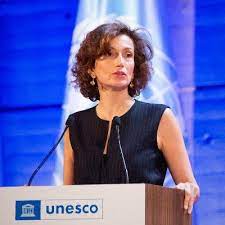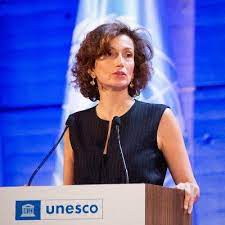The United Nations Educational, Scientific and Cultural Organization (UNESCO) has said that it recorded attacks against journalists in the context of elections in at least 89 elections in 70 countries around the world between January 2019 and June 2022 with law enforcement agents being responsible for almost half of the 759 journalists and media professionals that were attacked.
The UN agency also reported that it recorded attacks against journalists in connection with the coverage of protests, public demonstrations and riots in at least 101 countries from January 2015 to August 2021, noting that the majority of the attacks have been committed by police and security forces with at least 13 journalists killed in such contexts during the period.
The findings and trends are contained in a new report issued by UNESCO in November 2023 to commemorate this year’s International Day to End Impunity for Crimes against Journalists, which is marked on November 2 of every year.
Titled “The Role of Law Enforcement Agents: Ensuring Safety of Journalists during Public Demonstrations and Elections”, the 20-page report noted “Police use of non-lethal ammunition ranging from rubber bullets to pepper balls, has injured dozens of journalists, and many other journalists have been arrested, beaten and in a few cases humiliated.”
It reported that 42 percent of the 759 attacks against journalists and other media professionals related to elections which it registered in the context of at least 89 elections in 70 countries around the world from January 2019 to June 2022 were committed by law enforcement agents.
Other key trends and findings documented in the report are:
• During the COVID-19 pandemic, which coincided with a rise in public demonstrations across the world despite lockdowns and other government-imposed restrictions, in some of the worst cases, journalists were physically assaulted by anti-vaccination protestors, as well as by government officials and security forces, or imprisoned for their coverage of state contracts issued under the pandemic.
• During elections and public demonstrations, government authorities worldwide have authorized internet shutdowns and disruptions, censorship of the media and critical voices, as well as digital surveillance of journalists in the name of public order and national security.
• Intimidation and violence against women journalists online have increased with the surveyed women journalists saying that reporting on themes of “politics and elections” was the second most likely trigger for online harassment and abuse.
UNESCO stressed that law enforcement agents are the most visible manifestation of government authority and as such, any misconduct is likely to reflect badly on the State authorities as any violence towards journalists or the public is unacceptable and will most likely attract negative media coverage from the press and private citizens using social media.
Besides, it said, the behaviour and actions of law enforcement agents during public assemblies, especially towards journalists, are key to their responsibilities in upholding and enabling freedom of expression while maintaining public order safely.
UNESCO therefore recommended that law enforcement agents should cultivate a good and professional relationship between them and media outlets most likely to cover public demonstrations, meet with journalists and talk about their different roles so there is more understanding within the community about what local law enforcement agents are doing to keep them safe.
It suggested that law enforcement agents should facilitate the work of journalists, providing as much access as possible to a public assembly and any related policing operation, identifying press areas or a defined media perimeter that will give journalists a safe vantage point, and discuss these in advance with journalists while also understanding that they are not obliged to stay there.
In addition, UNESCO said, law enforcement agents should respect journalists’ safety and refrain from using any form of obstruction of, or force or pressure against, journalists but should protect the media and ensure a safe working environment by taking appropriate preventive, effective and timely operational measures, including police protection from attacks by the hostile groups.
It stressed the importance of allocating enough resources for the proper protection of the media during public assemblies.
UNESCO noted that although no authorisation can be required of journalists wanting to report on events of public interest, special accreditation can be required for specific reasons of space or security, such as a press conference with high-level officials and authorities.
But it pointed out that in public areas, space is usually not limited, and would therefore not require special accreditation, except in media perimeters set up by law enforcement agents to protect journalists.
UNESCO advised law enforcement agents to avoid creating a climate that is hostile to the media, undermines its values, and is detrimental to the safety of journalists but instead to monitor and report incidents involving the safety of journalists to understand the challenges they face and enable effective and responsive protocols and confidence building when dealing with their safety.
It said during elections, it is vital for law enforcement agents to remain neutral and demonstrate this neutrality through their communication, behaviour and the arrangements they put in place through the various stages before, during and after an election while consideration should be given to the coverage needs and safety of members of the press in all operational planning.
UNESCO also recommended that particular attention should be devoted to the specific threats and risks that women journalists face in the exercise of their work, adding that it is important to take a gender-sensitive approach when considering measures to address the safety of journalists, especially online.
It suggested the establishment of a media perimeter, especially during demonstrations, to facilitate access to information and maintain the safety of journalists, noting that the media perimeter should provide good access to the scene or location, and remain at a safe distance to ensure protection.
UNESCO stressed the need to respect the media’s professional equipment at all times, saying that the confiscation or damaging of the tools of their trade, such as cameras or recording equipment, or recordings, is unlawful.
Equally, it said, putting a hand in front of a lens, seizing and damaging their tools of trade such as cameras or recording equipment or tampering with them and erasing recordings is unlawful, adding that if law enforcement agents break or smash equipment deliberately, this should be considered a criminal offence and those responsible should be held accountable.
UNESCO recommended that with regard to the seizure of journalists’ equipment, a clear due process of law should be followed, with a particular concern to protect the confidentiality of sources.
It also stressed that law enforcement agents should not use any form of obstruction, force or pressure against journalists and that if the dispersal of public assemblies is in conformity with the law and necessary to maintain public order, journalists should be able to exercise their work freely during the dispersal operations without being required to leave the premises, as long as they position themselves in such a way that they cannot be confused with the demonstrators and do not obstruct the action of the police.
UNESCO insisted that “It is their (the journalists’) duty as media professionals to provide coverage, and they should be afforded the same privileges by the police as if the demonstration were sanctioned.”







